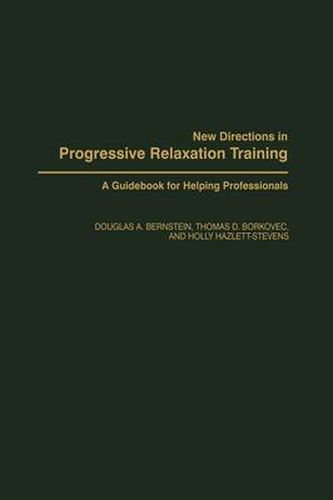Readings Newsletter
Become a Readings Member to make your shopping experience even easier.
Sign in or sign up for free!
You’re not far away from qualifying for FREE standard shipping within Australia
You’ve qualified for FREE standard shipping within Australia
The cart is loading…






Psychotherapy continues to progress at a remarkable rate as researchers become ever more creative in the development and application of a wide variety of empirically based techniques. Older techniques have been refined and newer ones have emerged. Both old and new techniques are being quantified, assessed and compared in group design research, and, for the first time since modern therapy’s beginnings in the writings of Sigmund Freud, remarkable strides have been made in asking and answering vital questions about the effectiveness of various treatment strategies. One such strategy, Progressive Relaxation Training, grew out of a set of methods originating in the 1930s in the writings of Edmund Jacobson. The primary purpose of this guide is to set forth in detail the therapist behaviours and skills necessary for the effective application of progressive relaxation training. The guide is designed to provide therapists in many disciplines - including psychology, psychiatry, social work, pastoral counselling, nursing and rehabilitation services, for example - with the tools they need to train their clients in relaxation. The guide is also designed to be used in research on stress and stress management, psychotherapy outcome, and related topics; this purpose is particularly important because there are few manuals available which describe in detail the actual procedures used in relaxation training.
$9.00 standard shipping within Australia
FREE standard shipping within Australia for orders over $100.00
Express & International shipping calculated at checkout
Psychotherapy continues to progress at a remarkable rate as researchers become ever more creative in the development and application of a wide variety of empirically based techniques. Older techniques have been refined and newer ones have emerged. Both old and new techniques are being quantified, assessed and compared in group design research, and, for the first time since modern therapy’s beginnings in the writings of Sigmund Freud, remarkable strides have been made in asking and answering vital questions about the effectiveness of various treatment strategies. One such strategy, Progressive Relaxation Training, grew out of a set of methods originating in the 1930s in the writings of Edmund Jacobson. The primary purpose of this guide is to set forth in detail the therapist behaviours and skills necessary for the effective application of progressive relaxation training. The guide is designed to provide therapists in many disciplines - including psychology, psychiatry, social work, pastoral counselling, nursing and rehabilitation services, for example - with the tools they need to train their clients in relaxation. The guide is also designed to be used in research on stress and stress management, psychotherapy outcome, and related topics; this purpose is particularly important because there are few manuals available which describe in detail the actual procedures used in relaxation training.